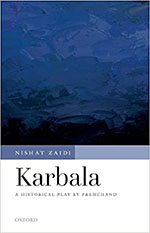Karbala: A Historical Play, was written during the second half of 1923 and published in 1924: a period of great significance in the history of India’s struggle for freedom. The writer, Munshi Premchand, also a man of significance, was a well-known Urdu and Hindi writer. Perhaps there is nary a child in India, or a man of some intellect, who has not read his Godan, the greatest Hindi novel of modern Indian literature written in 1936, and Eidgah, a well-known story published in 1933.
Premchand was a prolific writer, wrote many of his novels and stories in both Hindi and Urdu. His legacy was thus claimed by the proponents of both the sister languages. He had also translated certain works from other languages into Hindi—works which included the stories of Leo Tolstoy, and certain works of John Galsworthy—an English novelist who had won the Nobel Prize for Literature in 1932, and many of whose works promoted social reforms like women’s rights, animal welfare and prison reforms. Premchand has also left behind at least five plays, and one film script, The Mill (1934) in which he appeared in a cameo. Amongst his plays, Karbala is the first, and perhaps the most well-known. He was no ordinary man of literature creating or playing with inane words: Godan dealt with socio-economic deprivation as well as exploitation of the poor.


I think the admin of this web page is really working hard in support of his web site,
for the reason that here every material is quality based data.
Here is my web page vpn special coupon
Hello everyone, it’s my first pay a visit at this
website, and post is truly fruitful designed for me, keep up posting such content.
My site – vpn coupon code 2024